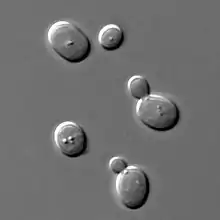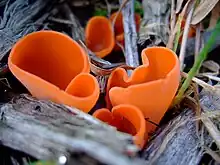Saccharomyceta
Saccharomyceta is a clade of fungi containing Pezizomycotina and Saccharomycotina, or all Ascomycete fungi except Taphrinomycotina according to the 2007 fungal phylogeny[1] "The Mycota: A Comprehensive Treatise on Fungi as Experimental Systems for Basic and Applied Research"[2] and Tedersoo et al. 2018.[3]
| Ascomycota |
| ||||||||||||||||||||||||||||||||||||||||||||||||||||||||||||||||||||||||||||||||||||||||||||||||||||||||||||||||||||||||||||||
| Saccharomyceta | |
|---|---|
 | |
| Yeast of the species Saccharomyces cerevisiae | |
 | |
| Aleuria aurantia | |
| Scientific classification | |
| Domain: | Eukaryota |
| Kingdom: | Fungi |
| Division: | Ascomycota |
| (unranked): | Saccharomyceta |
| Subdivisions/classes | |
See also
References
- Hibbett, David S.; et al. (2007-05-01). "A higher-level phylogenetic classification of the Fungi". Mycological Research. 111 (5): 509–547. doi:10.1016/j.mycres.2007.03.004. ISSN 0953-7562. PMID 17572334. S2CID 4686378.
- McLaughlin, David; Spatafora, Joseph W., eds. (2014). Systematics and Evolution: Part A. The Mycota (2 ed.). Berlin Heidelberg: Springer-Verlag. ISBN 978-3-642-55317-2.
- Tedersoo, Leho; Sanchez-Ramırez, Santiago; Koljalg, Urmas; Bahram, Mohammad; Doring, Markus; Schigel, Dmitry; May, Tom; Ryberg, Martin; Abarenkov, Kessy (22 February 2018). "High-level classification of the Fungi and a tool for evolutionary ecological analyses". Fungal Diversity. 90 (1): 135–159. doi:10.1007/s13225-018-0401-0.
This article is issued from Wikipedia. The text is licensed under Creative Commons - Attribution - Sharealike. Additional terms may apply for the media files.